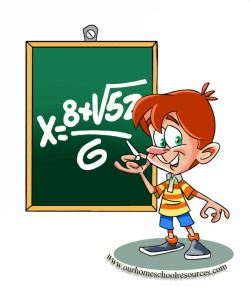Homeschool Math Curriculum for Kindergarten
This sample homeschool math curriculum for kindergarten focuses on building foundational math skills such as number recognition, basic counting, and simple operations while incorporating hands-on and engaging activities
Week 1-2: Introduction to Numbers and Counting
- Recognize numbers 1-5.
- Count objects up to 5.
- Introduction to "more than" and "less than".
Week 3-4: Numbers 6-10
- Recognize and write numbers 6-10.
- Count objects up to 10.
- Understand number sequences up to 10.
Week 5-6: Basic Shapes
- Recognize and name basic shapes: square, triangle, circle, rectangle.
- Identify shapes in the environment.
- Sort objects based on their shape.
Week 7-8: More Advanced Shapes and Patterns
- Recognize and name ovals, hexagons, and octagons.
- Introduction to simple patterns using colours and shapes.
- Recognizing and continuing a pattern.
Week 9-10: Colors and Sorting
- Name primary colours.
- Sort objects by colour.
- Combine colour and shape knowledge: sort blue circles from yellow squares, etc.
Week 11-12: Numbers 11-15
- Recognize and write numbers 11-15.
- Count objects up to 15.
- Simple addition and subtraction within 10 using tangible objects.
Week 13-14: Comparing Sizes
- Understand and use terms big, small, tall, short, long, etc.
- Compare objects by size.
Week 15-16: Spatial Concepts
- Understand and use positional words: in, on, under, next to, etc.
- Practical activities, like placing toys in/on/under a box.
Week 17-18: Numbers 16-20
- Recognize and write numbers 16-20.
- Count objects up to 20.
- Continue simple addition and subtraction, moving towards abstract (without objects).
Week 19-20: Introduction to Money
- Recognize coins: penny, nickel, dime.
- Understand the value of each coin.
- Simple transactions using pretend play.
Week 21-22: Time Concepts
- Understand daytime vs. nighttime.
- Introduction to the concept of today, tomorrow, and yesterday.
- Recognize different times of the day: morning, afternoon, and evening.
Week 23-24: Simple Measurement Concepts
- Introduction to long vs. short.
- Use non-standard measurements (e.g., "The book is four toy cars long").
Week 25-26: Numbers 21-30
- Recognize and write numbers 21-30.
- Count objects up to 30.
- Simple addition and subtraction within 20.
Week 27-28: Simple Graphing
- Use objects to make simple bar graphs.
- Answer questions based on the graph ("Which has more?").
Week 29-30: Basic Fractions
- Introduction to halves and wholes using food or paper (cutting an apple or a paper circle in half).
Week 31-32: Sequencing and Ordinals
- First, second, third, etc.
- Sequence daily events or story events.
Week 33-34: Math in Nature
- Counting objects in nature.
- Recognizing patterns in the environment.
- Measuring objects using non-standard measures.
Week 35-36: Review and Exploration
- Revisit challenging concepts.
- Explore math through play: math-based puzzles, games, etc.
- Assess understanding to ensure readiness for the next level.
Remember, at this age, keeping lessons engaging and fun is crucial. Using tangible objects, games, and practical applications of math concepts can help maintain interest and improve understanding. Adjust the curriculum based on the child's pace and needs.

What's in our homeschool...
Finding the right homeschooling curriculum that best fits my children's needs was one of the most significant challenges I had when we first started our journey. I found different curricula that best suit my children's needs...
As a parent, a homeschooled reading curriculum was at the top of my mind when we started homeschooling. English was one of the requirements in our state, and what better way to learn English than to read. Getting kids interested...
There are various homeschool math curricula that you can use in your homeschooling. As for me, I use Mathletics and Khan Academy for my children. They are beneficial for us. I use Mathletics for our homeschool math ...
A homeschool art curriculum has a lot of benefits to children. This includes the development of language and communication skills, dexterity, motor skills, creativity, focus, persistence, problem-solving skills, collaboration...
Our homeschool science curriculum includes a few different things. Science is really a wonderful thing to be studied and explored. When we introduce our children to various opportunities for science learning, they will experience...



